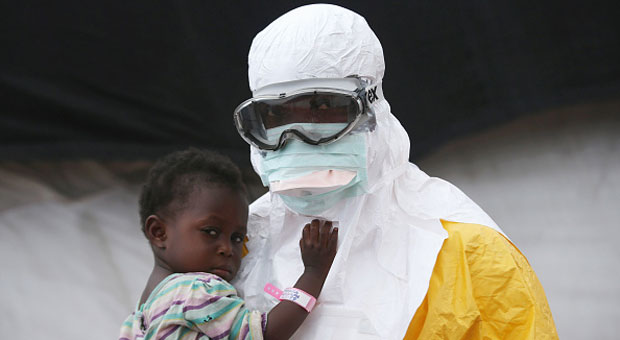Ebola: why the fight against the disease is far from over
As Liberia releases its last Ebola patient, the virus continues to spread in other West African nations

A free daily email with the biggest news stories of the day – and the best features from TheWeek.com
You are now subscribed
Your newsletter sign-up was successful
The last Ebola patient in Liberia has been discharged from hospital, after the country went over a week without declaring any new cases of the disease.
Beatrice Yardolo, who lost three children to the disease, has tested negative for Ebola after receiving two weeks of treatment in the capital Monrovia. Yardolo told reporters she was "one of the happiest persons on earth" as she left the treatment centre to return home.
"There was a lot of excitement because we feel that this is a victory," Tolbert Nyenswah, Liberia's deputy health minister told the New York Times. "But it's not over yet," he admitted.
The Week
Escape your echo chamber. Get the facts behind the news, plus analysis from multiple perspectives.

Sign up for The Week's Free Newsletters
From our morning news briefing to a weekly Good News Newsletter, get the best of The Week delivered directly to your inbox.
From our morning news briefing to a weekly Good News Newsletter, get the best of The Week delivered directly to your inbox.
The deadliest Ebola outbreak in history has claimed almost 10,000 lives, the overwhelming majority in Liberia, Sierra Leone and Guinea. Liberia has been worst affected by the outbreak, where 4,117 people are known to have died from the disease.
Officials have warned that the country is still at least weeks away from being declared Ebola-free. The World Health Organization (WHO) predicts further outbreaks in the country are likely, as the disease continues to be extremely mobile.
"We look at the three countries as really a single country, so while it's good news that Liberia itself has no new cases, the populations are so mobile in that region that there could easily be re-importations of cases," WHO spokesman Gregory Hartl told the BBC.
"We have to get down to zero in all three countries before we can consider this thing beaten," he said.
A free daily email with the biggest news stories of the day – and the best features from TheWeek.com
In neighbouring Sierra Leone and Guinea, the picture is much bleaker. The number of new cases recently increased sharply in both countries, according to the latest weekly figures from the WHO.
The latest numbers "suggest that the need for early isolation and treatment is not yet understood, accepted or acted upon," said the health organisation.
-
 Local elections 2026: where are they and who is expected to win?
Local elections 2026: where are they and who is expected to win?The Explainer Labour is braced for heavy losses and U-turn on postponing some council elections hasn’t helped the party’s prospects
-
 6 of the world’s most accessible destinations
6 of the world’s most accessible destinationsThe Week Recommends Experience all of Berlin, Singapore and Sydney
-
 How the FCC’s ‘equal time’ rule works
How the FCC’s ‘equal time’ rule worksIn the Spotlight The law is at the heart of the Colbert-CBS conflict
-
 Epstein files topple law CEO, roil UK government
Epstein files topple law CEO, roil UK governmentSpeed Read Peter Mandelson, Britain’s former ambassador to the US, is caught up in the scandal
-
 Iran and US prepare to meet after skirmishes
Iran and US prepare to meet after skirmishesSpeed Read The incident comes amid heightened tensions in the Middle East
-
 Israel retrieves final hostage’s body from Gaza
Israel retrieves final hostage’s body from GazaSpeed Read The 24-year-old police officer was killed during the initial Hamas attack
-
 China’s Xi targets top general in growing purge
China’s Xi targets top general in growing purgeSpeed Read Zhang Youxia is being investigated over ‘grave violations’ of the law
-
 Panama and Canada are negotiating over a crucial copper mine
Panama and Canada are negotiating over a crucial copper mineIn the Spotlight Panama is set to make a final decision on the mine this summer
-
 Why Greenland’s natural resources are nearly impossible to mine
Why Greenland’s natural resources are nearly impossible to mineThe Explainer The country’s natural landscape makes the task extremely difficult
-
 Iran cuts internet as protests escalate
Iran cuts internet as protests escalateSpeed Reada Government buildings across the country have been set on fire
-
 US nabs ‘shadow’ tanker claimed by Russia
US nabs ‘shadow’ tanker claimed by RussiaSpeed Read The ship was one of two vessels seized by the US military